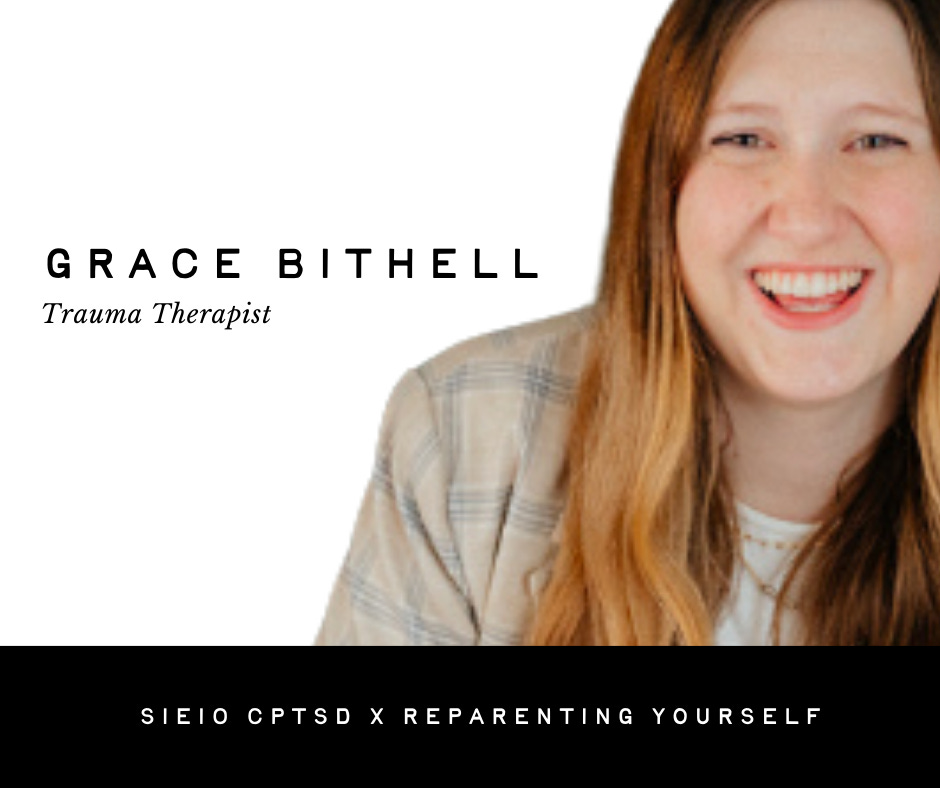Hi, again — It’s Micah with Modern Hysteria — your newsletter and podcast about the taboos of women’s health — and this week we’re going reeealllll deep.
In this episode, trauma therapist Grace Bithell explains:
🧠 complex post-traumatic stress disorder (CPTSD), an oft-overlooked mental health condition that affects your self-image and relationships
🖤 reparenting yourself to heal from CPTSD (and “break the cycle”)
The Taboo
The sneaky thing about CPTSD is that the people who have it are often the last to believe it. Most people haven’t even heard of it.
I, too, brushed off my first PTSD diagnosis, thinking it was ludicrous: Veterans get PTSD, for fuck’s sake! I haven’t been in combat. 🙄
Here’s the thing:
PTSD typically develops after a single traumatic event or a series of traumatic events that are clearly identifiable.
CPTSD (Complex PTSD) is caused by chronic, repeated trauma — often in childhood or long-term abuse.
Complex post-traumatic stress disorder is what Grace calls “the survivor’s illness.” I’ve also heard it called “the shame disorder.” It’s a set of learned survival mechanisms that helped you cope as a child but, in your adult life, can lead to:
anxiety
hyper-vigilance
difficulty regulating emotions
deep shame and poor self image
trust issues
What causes CPTSD?
Growing up with abusive, neglectful, or emotionally unavailable caregivers, living in a violent home, witnessing domestic violence can lead to CPTSD, which develops over time when a person feels trapped in unsafe or unpredictable situations.
Because the brain and nervous system adapt to survive in these conditions, people with CPTSD often struggle with trust, emotions, and self-worth because trauma alters the parts of the brain that process memory, decision-making, and emotional regulation.
Why this matters:
People with CPTSD may not realize they have a trauma-related diagnosis.
PTSD treatment alone may not address the deep emotional wounds of CPTSD.
Reparenting x CPTSD
People with CPTSD often grew up in environments where their emotional needs weren’t met, or they were ignored, criticized, or expected to be “the strong one.” They learned to push down their feelings, blame themselves, or put other people’s needs first just to survive.
Reparenting is the process of giving yourself the love, care, and validation you didn’t get as a child so you can meet your own needs now by learning to self-soothe (without relying on substance abuse 🤞🏼), setting boundaries, or having self-compassion (this is a big buzzword for me this year!).
It is literally never too late to reparent yourself.
For people with CPTSD, reparenting is a key part of healing because you learn to replace those old coping strategies, like deep shame and self-criticism, with self-compassion and kindness (easier said than done, for sure).
With reparenting you can teach the voice in your head (the “harsh Inner Critic”) to be kind to you for the perhaps the first time.
Links + Resources
Grace and I both learned about CPTSD in this book by Stephanie Foo: Why My Bones Know: A Memoir of Healing from Complex Trauma
THE CPTSD book: Complex PTSD: From Surviving to Thriving by psychotherapist Pete Walker
Grace’s blog about trauma, OCD, and CPTSD
The Guest
Grace Bithell is a licensed clinical social worker who specializes in helping people who had “difficult parents.” She grew up in a fostering family which was her first exposure to complex childhood trauma and inspired her to become a trauma therapist (and she’s been published seven times in Fostering Families Today!)
📍 Location: Utah, USA
Get in touch with Grace here.
“Stop giving affirmations to yourself and start giving affirmations to your inner child.”
Key Takeaways
1️⃣ CPTSD affects your emotions, relationships, and view of yourself. It is caused by long-term trauma in which a person feels unsafe, unseen, or trapped.
2️⃣ Shame feels like a personal flaw, but it’s a survival response. CPTSD usually comes with deep wells of shame because you learned to blame yourself rather than recognize your needs were not being met.
3️⃣ Reparenting yourself is a way to start healing from CPTSD. That means: validating your own emotions; setting boundaries; and responding kindly to yourself.
Time Stamps
4:57: What is CPTSD?
10:24: The difference between CPTSD and PTSD
17:47: Emotional flashbacks
30:19: Parenting with CPTSD
46:51: CPTSD red flags
That’s all for this episode. If this hit home, please leave a comment and let me know (I read every single one!) or share with someone who may need to hear it.
Upcoming
S1E11 Narcissistic Abuse x Telling Your Story with
S1E12 Pelvic Floor Dysfunction x Incontinence with Patricia Siegel
S1E13 Female Friendships x Escaping Toxic Relationships with Stephanie McPhail
More soon
— Micah














